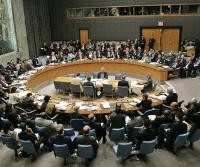On Friday, July 11, senior British and American leaders denounced China and Russia for vetoing a U.N. Security Council (UNSC) resolution that would have imposed sanctions against Zimbabwe's President Robert Mugabe and his closest supporters for using violence and other manipulations during last month's presidential elections. The U.S. ambassador to the United Nations, Zalmay Khalilzad, criticized Moscow and Beijing for having sided "with Mugabe against the people of Zimbabwe." In his remarks to the council after the vote, Khalilzad observed that, "The u-turn in the Russian position is particularly surprising and disturbing." Khalilzad then made the stinging comment that, "The Russian performance here today raises questions about its reliability as a G-8 partner." U.S. officials indicated that Russian government representatives had initially indicated Moscow would abstain on the vote. The G-8 leaders had adopted a statement on Zimbabwe calling for "financial and other measures against those individuals responsible for the violence." Foreign observers apparently failed to appreciate the limited nature of the Russian support for sanctions. In a press conference after the statement's adoption, Russian President Dmitry Medvedev said that the G-8 declaration showed that the Zimbabwean elections "have left the feeling of dissatisfaction in the world community." Even so, he added "so far there are no concrete decisions as to how the United Nations should proceed in this case and whether special further decisions are necessary."
Chinese-Russian Veto of U.N. Zimbabwe Sanctions Unsurprising

